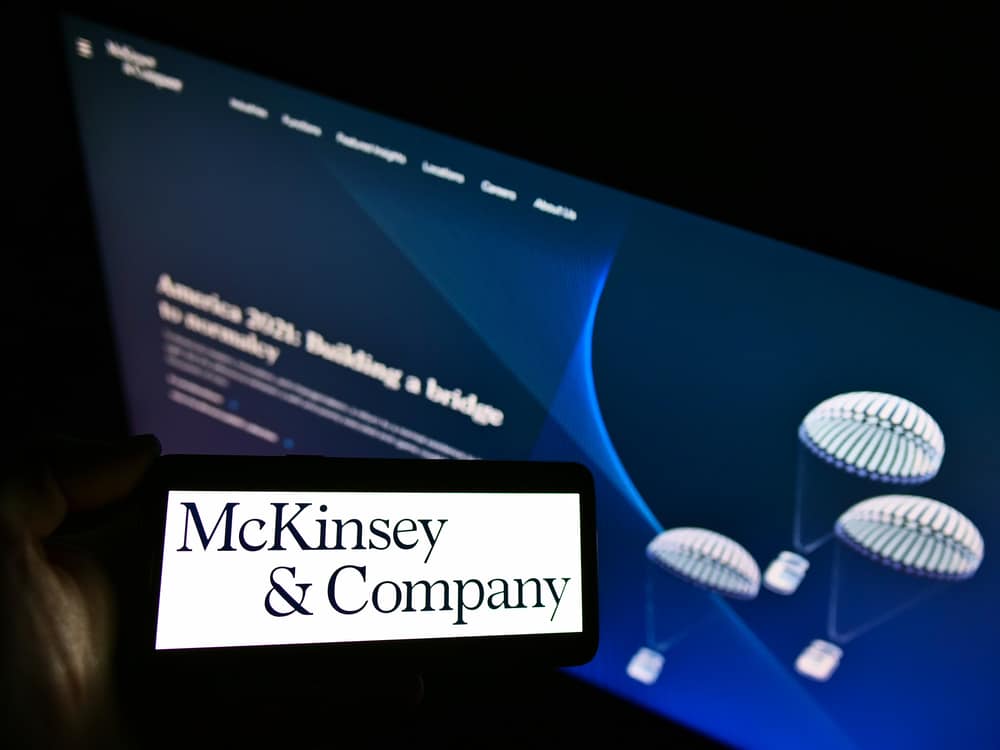McKinsey’s recent report projects a critical role for generative artificial intelligence (AI) in the industry, forecasted to reach a $15.7 trillion valuation by 2030.
ChatGPT and Stable Diffusion Becoming Channel for Economic Revolution
The report acknowledges that generative AI applications are rapidly gaining dominance. The report illustrates that ChatGPT and Stable Diffusion are setting the stage to spark an economic revolution.
The global management consulting firm considers generative AI harboring the inherent potential to inject over $4.4 trillion into the global economy annually. The firm approximates the input as accounting for 15% – 40% of the AI impact on the global economy.
Generative AI to Contribute $2 – $4 Trillion Injection into Economy
McKinsey report estimates the generative AI contribution to translate from $2.6 trillion to $4.4 trillion annually. The 63 cases reviewed echoed the findings by KPMG US, finding that generative AI nurtures a unique niche within the technological realm. Business leaders are optimistic that facilitating existing digital-oriented operations will optimize their economic potential.
The report detailed that generative AI yields new content by utilizing pre-trained data. McKinsey illustrated that applications such as Stable Diffusion, Microsoft Copilot, and ChatGPT are gaining popularity, particularly with ever-rising use cases in diverse settings. The report admitted that rapid growth is inevitable as they can resolve complex medical diagnoses and expedite pure artistic creations.
AI-driven Shifts in Businesses Inevitable to Tap Artificial Intelligence Potential
McKinsey supported the view by the business consultancy KPMG report that various executives admit that generative AI will deliver AI-driven shifts within the business. In addition, the report accentuated AI’s inherent potential, including high-tech, banking, and life sciences. The industries are to benefit from an increased percentage of earnings earned via generative AI.
The report highlights the revolution delivered by generative AI through enhanced individual productivity and automation in its infancy days. McKinsey explained that the generative AI versions could potentially automate work activities to the extent that would absorb 60-70% of workforce time.
Generative AI to Deliver 15% – 40% of AI Impact
McKinsey acknowledges that various sectors would experience a higher impact. Customer operations, research, and software development would bear the greatest impact of generative AI.
The report illustrated that generative AI could increase overall AI impact by 15% to 40%. Life sciences, tech, and financial services sectors are poised to reap substantial benefits of generative AI.
McKinsey projects that full implementation of use cases could deliver a billion-dollar untapped value for the banking industry. In particular, generative AI could yield a $200 – $340 billion annual increment in the banking sector value. Additionally, retailers could reap $400 to $600 billion annual gain annually.
AI Input to Global Economy to Reach $17.5 Trillion
McKinsey admits that the AI-fueled transformation is inevitable for the workforce and would likely accelerate technology advancements. An estimated half of the current work activities would realize automation by 2060. This realization is worrying Americans, particularly as AI-based tools garner accelerated popularity.
A comparative review of PriceWaterhouseCoopers (PWC) reports projected the AI-led contribution to the global economy to hit $17.5 trillion in seven years. The optimistic forecasts replicated in the KPMG.US report are sparking increased investor interest, now ditching cryptos to leverage emerging opportunities in artificial intelligence technologies.
Hedge Funds and Investors Shift Focus to AI Startups with Imminent Departure from Cryptos
The realization of untapped opportunities in AI is drawing more investors and hedge funds to explore the generative AI’s implications for society and business. Such reflects increased allocations to investment in AI startups and away from crypto.
The PWC echoes McKinsey’s observation that integrating generative AI with similar technologies could yield 3.3 points in annual productivity growth. PWC report details that more businesses could seek accelerated integration of a sustainable and inclusive world. Its accomplishment would involve effective management of worker transitions and resolving potential risks.
Editorial credit: T. Schneider / Shutterstock.com
At Tokenhell, we help over 5,000 crypto companies amplify their content reach—and you can join them! For inquiries, reach out to us at info@tokenhell.com. Please remember, cryptocurrencies are highly volatile assets. Always conduct thorough research before making any investment decisions. Some content on this website, including posts under Crypto Cable, Sponsored Articles, and Press Releases, is provided by guest contributors or paid sponsors. The views expressed in these posts do not necessarily represent the opinions of Tokenhell. We are not responsible for the accuracy, quality, or reliability of any third-party content, advertisements, products, or banners featured on this site. For more details, please review our full terms and conditions / disclaimer.

